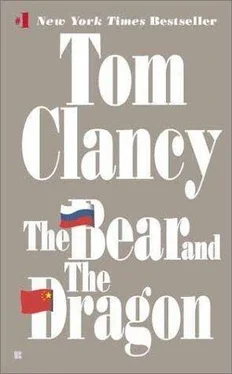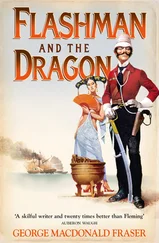Tom Clancy - The Bear and the Dragon
Здесь есть возможность читать онлайн «Tom Clancy - The Bear and the Dragon» весь текст электронной книги совершенно бесплатно (целиком полную версию без сокращений). В некоторых случаях можно слушать аудио, скачать через торрент в формате fb2 и присутствует краткое содержание. Год выпуска: 2001, ISBN: 2001, Жанр: Триллер, на английском языке. Описание произведения, (предисловие) а так же отзывы посетителей доступны на портале библиотеки ЛибКат.
- Название:The Bear and the Dragon
- Автор:
- Жанр:
- Год:2001
- ISBN:780425180969
- Рейтинг книги:3 / 5. Голосов: 1
-
Избранное:Добавить в избранное
- Отзывы:
-
Ваша оценка:
- 60
- 1
- 2
- 3
- 4
- 5
The Bear and the Dragon: краткое содержание, описание и аннотация
Предлагаем к чтению аннотацию, описание, краткое содержание или предисловие (зависит от того, что написал сам автор книги «The Bear and the Dragon»). Если вы не нашли необходимую информацию о книге — напишите в комментариях, мы постараемся отыскать её.
The Bear and the Dragon — читать онлайн бесплатно полную книгу (весь текст) целиком
Ниже представлен текст книги, разбитый по страницам. Система сохранения места последней прочитанной страницы, позволяет с удобством читать онлайн бесплатно книгу «The Bear and the Dragon», без необходимости каждый раз заново искать на чём Вы остановились. Поставьте закладку, и сможете в любой момент перейти на страницу, на которой закончили чтение.
Интервал:
Закладка:
And so?” Zhang Han San asked.
“And so, our Russian neighbors have the luck of the devil,” Fang Gan replied, handing the folder over to the senior Minister Without Portfolio. Zhang was seven years older than Fang, closer to his country’s Premier. But not that much, and there was little competition between the two ministers. “What we could do with such blessings …” His voice trailed off.
“Indeed.” That any country could have made constructive use of oil and gold was an obvious truth left unsaid. What mattered here and now was that China would not, and Russia would.
“I had planned for this, you know.”
“Your plans were masterful, my friend,” Fang said from his seat, reaching inside his jacket for a pack of cigarettes. He held it up to seek approval from his host, who’d quit the habit five years before. The response was a dismissive wave of the hand, and Fang tapped one out and lit it from a butane lighter. “But anyone can have bad luck.”
“First the Japanese failed us, and then that religious fool in Tehran,” Zhang groused. “Had either of our supposed allies performed as promised, the gold and the oil would now be ours …”
“Useful, certainly, for our own purposes, but I am somewhat doubtful on the subject of world acceptance of our notionally prosperous status,” Fang said, with a lengthy puff.
The response was yet another wave of the hand. “You think the capitalists are governed by principle? They need oil and gold, and whoever can provide it cheaply gets to sell the most of it. Look whom they buy from, my old friend, anyone who happens to have it. With all the oil in Mexico, the Americans can’t even work up the courage to seize it. How cowardly of them! In our case, the Japanese, as we have learned to our sorrow, have no principles at all. If they could buy oil from the company which made the bombs dropped on Hiroshima and Nagasaki, they would. They call it realism,” Zhang concluded scornfully. The real cite came from Vladimir Il’ych Ulyanov, Lenin himself, who’d predicted, not unreasonably, that capitalist nations would compete among themselves to sell the Soviet Union the rope with which the Russians would later hang them all. But Lenin had never planned for Marxism to fail, had he? Just as Mao hadn’t planned for his perfect political/economic vision to fail in the People’s Republic, as evidenced by such slogans as “The Great Leap Forward,” which, among other things, had encouraged ordinary peasants to smelt iron in their backyards. That the resulting slag hadn’t been useful even to make andirons with was a fact not widely advertised in the East or West.
“Alas, fortune did not smile upon us, and so, the oil and gold are not ours.”
“For the moment,” Zhang murmured.
“What was that?” Fang asked, not having quite caught the comment.
Zhang looked up, almost startled from his internal reverie. “Hmph? Oh, nothing, my friend.” And with that the discussion turned to domestic matters. It lasted a total of seventy-five minutes before Fang went back to his office. There began another routine. “Ming,” Fang called, gesturing on the way to his inner office.
The secretary stood and scampered after him, closing the door behind before finding her seat.
“New entry,” Fang said tiredly, for it had been a lengthy day. “Regular afternoon meeting with Zhang Han San, and we discussed …” His voice went on, relating the substance and contents of the meeting. Ming duly took her notes for her minister’s official diary. The Chinese were inveterate diarists, and besides that, members of the Politburo felt both an obligation (for scholarly history) and a personal need (for personal survival) to document their every conversation on matters political and concerning national policy, the better to document their views and careful judgment should one of their number make an error of judgment. That this meant his personal secretary, as, indeed, all of the Politburo members’ personal secretaries, had access to the most sensitive secrets of the land was not a matter of importance, since these girls were mere robots, recording and transcription machines, little more than that-well, a little more, Fang and a few of his colleagues thought with the accompanying smile. You couldn’t have a tape machine suck on your penis, could you? And Ming was especially good at it. Fang was a communist, and had been for all of his adult life, but he was not a man entirely devoid of heart, and he had the affection for Ming that another man, or even himself, might have had for a favored daughter … except that you usually didn’t fuck your own daughter…. His diary entry droned on for twenty minutes, his trained memory recounting every substantive part of his exchange with Zhang, who was doubtless doing the same with his own private secretary right at this moment-unless Zhang had succumbed to the Western practice of using a tape machine, which would not have surprised Fang. For all of Zhang’s pretended contempt for Westerners, he emulated them in so many ways.
They’d also tracked down the name of Klementi Ivan’ch Suvorov. He was yet another former KGB officer, part then of the Third Chief Directorate, which had been a hybrid department of the former spy agency, tasked to overseeing the former Soviet military, and also to overseeing certain special operations of the latter force, like the Spetsnaz, Oleg Provalov knew. He turned a few more pages in Suvorov’s package, found a photograph and fingerprints, and also discovered that his first assignment had been in the First Chief Directorate, known as the Foreign Directorate because of its work in gathering intelligence from other nations. Why the change? he wondered. Usually in KGB, you stayed where you were initially put. But a senior officer in the Third had drafted him by name from the First … why? Suvorov, K. I., asked for by name by General Major Pavel Konstantinovich Kabinet. The name made Provalov pause. He’d heard it somewhere, but exactly where, he couldn’t recall, an unusual state of affairs for a long-term investigator. Provalov made a note and set it aside.
So, they had a name and a photo for this Suvorov fellow. Had he known Amalrik and Zimyanin, the supposed-and deceased-killers of Avseyenko the pimp? It seemed possible. In the Third Directorate he would have had possible access to the Spetsnaz, but that could have been a mere coincidence. The KGB’s Third Directorate had been mainly concerned with political control of the Soviet military, but that was no longer something the State needed, was it? The entire panoply of political officers, the zampoliti who had so long been the bane of the Soviet military, was now essentially gone.
Where are you now? Provalov asked the file folder. Unlike Central Army Records, KGB records were usually pretty good at showing where former intelligence officers lived, and what they were doing. It was a carryover from the previous regime that worked for the police agencies, but not in this case. Where are you? What are you doing to support yourself? Are you a criminal? Are you a murderer? Homicide investigations by their nature created more questions than answers, and frequently ended with many such questions forever unanswered because you could never look inside the mind of a killer, and even if you could, what you might find there didn’t have to make any sort of sense.
This murder case had begun as a complex one, and was only becoming more so. All he knew for certain was that Avseyenko was dead, along with his driver and a whore. And now, maybe, he knew even less. He’d assumed almost from the beginning that the pimp had been the real target, but if this Suvorov fellow had hired Amalrik and Zimyanin to do the killing, why would a former-he checked-lieutenant colonel in the Third Chief Directorate of the KGB go out of his way to kill a pimp? Was not Sergey Golovko an equally likely target for the killing, and would that not also explain the murder of the two supposed killers, for eliminating the wrong target? The detective lieutenant opened a desk drawer for a bottle of aspirin. It wasn’t the first headache this case had developed, and it didn’t seem likely that this would be the last. Whoever Suvorov was, if Golovko had been the target, he had not made the decision to kill the man himself. He’d been a contract killer, and therefore someone else had made the decision to do the killing.
Читать дальшеИнтервал:
Закладка:
Похожие книги на «The Bear and the Dragon»
Представляем Вашему вниманию похожие книги на «The Bear and the Dragon» списком для выбора. Мы отобрали схожую по названию и смыслу литературу в надежде предоставить читателям больше вариантов отыскать новые, интересные, ещё непрочитанные произведения.
Обсуждение, отзывы о книге «The Bear and the Dragon» и просто собственные мнения читателей. Оставьте ваши комментарии, напишите, что Вы думаете о произведении, его смысле или главных героях. Укажите что конкретно понравилось, а что нет, и почему Вы так считаете.






![Александр Ирвин - Tom Clancy’s The Division 2. Фальшивый рассвет [litres]](/books/417744/aleksandr-irvin-tom-clancy-s-the-division-2-falsh-thumb.webp)




